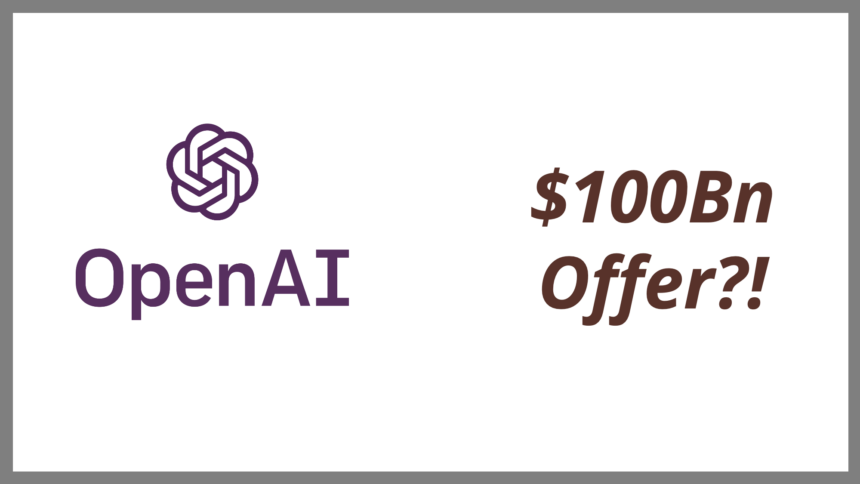16 February 2025: OpenAI unanimously rejects Musk’s $100Bn bid as an ‘attempt to disrupt competition.’
Elon Musk is prepared to walk away from his nearly $100 billion offer to acquire OpenAI if the company continues to operate as a nonprofit organization. His bid, which aims to reshape the AI giant, has become a high-stakes battle between Musk and OpenAI CEO Sam Altman, reflecting long-standing tensions over the future of artificial intelligence.
Musk, who co-founded OpenAI but later left, accuses the company of abandoning its original nonprofit mission in favor of profit-driven growth. He argues that his offer is off the table if OpenAI’s board reaffirms its commitment to nonprofit principles. This conflict highlights the growing divide in the AI industry over how artificial intelligence should be developed, governed, and monetized.
What’s Happening & Why This Matters
Musk’s $100 Billion Offer & Its Conditions
Musk, alongside a group of investors, submitted a $97.4 billion acquisition proposal for OpenAI. However, he has now stated that if OpenAI remains committed to its nonprofit mission, he will withdraw the offer entirely.
- Musk’s primary demand is that OpenAI’s board cease its transition into a for-profit structure and ensure its mission remains aligned with advancing AI for the benefit of humanity rather than corporate interests.
- The nonprofit debate: OpenAI operates under a unique structure—its nonprofit entity controls OpenAI LP, a for-profit subsidiary that has reached a $100 billion valuation in just a few years.
- Musk’s legal argument: He claims that OpenAI’s shift toward profit-making violates its founding charter, likening the move to a bait-and-switch for early backers who supported OpenAI as a nonprofit research organization.
OpenAI’s Response & Musk’s Alleged Contradictions
OpenAI has not formally rejected Musk’s bid but has publicly questioned his motives. In a court filing, OpenAI accused Musk of hypocrisy, arguing that he is attempting to acquire OpenAI’s assets while demanding it remains a nonprofit.
- OpenAI’s lawyers claim Musk cannot insist that OpenAI stay nonprofit while trying to take control of the organization for personal and business gain.
- The board asserts that OpenAI, as a nonprofit, has no legal or fiduciary obligation to entertain Musk’s offer.
- Sam Altman dismissed Musk’s actions, stating that Musk was more interested in stalling OpenAI’s progress than supporting its mission.

Legal & Ethical Battles
The legal battle between Musk and OpenAI extends beyond ownership—it raises fundamental questions about the governance, transparency, and future of artificial intelligence.
- Musk’s lawsuit, filed in early 2024, alleges OpenAI misled donors and supporters by prioritizing commercial success over its original mission.
- OpenAI argues that its current nonprofit-controlled for-profit model allows it to fund large-scale AI research without the limitations of a strict nonprofit structure.
- The conflict underscores a growing industry-wide debate: Should AI be developed as an open, nonprofit initiative, or should it operate under a corporate model for rapid growth and global scalability?
Musk’s Larger AI Strategy & Competitive Positioning
Musk has long been a vocal critic of OpenAI’s direction, particularly since Microsoft’s deep investment in the company. His AI venture, xAI, is now positioned as a competitor, leading many to speculate that his bid for OpenAI is a strategic maneuver rather than a purely philanthropic effort.
- Musk has repeatedly argued that AI should remain open-source and not be controlled by a single corporation.
- His AI startup, xAI, is actively developing Grok, a chatbot meant to rival OpenAI’s ChatGPT.
- Industry critics argue that Musk’s legal battle is more about slowing OpenAI’s dominance than preserving nonprofit principles, as it allows his AI ventures more time to gain traction.
TF Summary: What’s Next
Elon Musk’s $100 billion bid for OpenAI remains in limbo as both sides continue their legal and public disputes. If OpenAI reaffirms its nonprofit mission, Musk has vowed to withdraw the offer entirely. The battle over OpenAI’s future represents more than a simple acquisition—it is a critical turning point in the AI industry’s governance, commercialization, and ethical direction. Whether Musk follows through with his exit or pivots to another strategy remains to be seen, but one thing is clear: the fight for AI’s future is only beginning.
— Text-to-Speech (TTS) provided by gspeech


